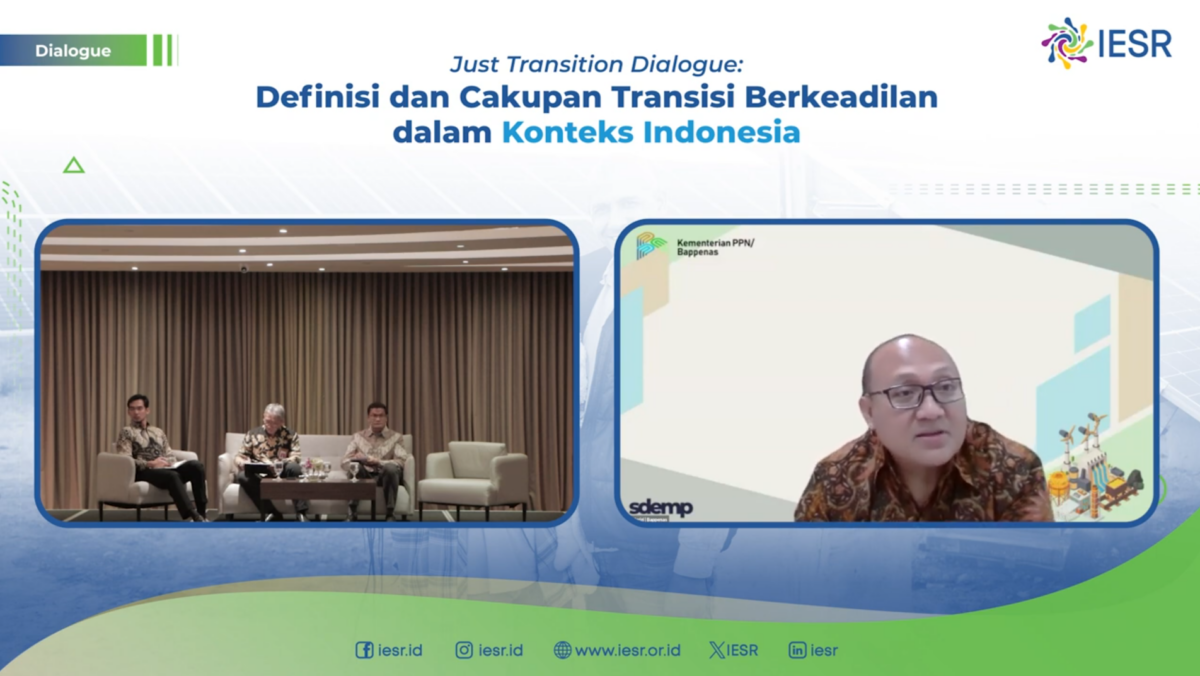Jakarta, 15 July 2024 – Just transition has become a widely discussed topic after the issue of energy transition was widely articulated. The idea of a just transition began in the 80s when the United States Government issued regulations on water and air pollution, ordering fossil, oil and gas companies to clean up their production systems. This policy had an impact on workers, and the union demanded compensation for affected workers.
In the Indonesian context, the scope and definition of a just transition is something that has not been fully agreed upon widely. It is important to immediately determine the definition of a just transition in the Indonesian context considering that as one of the fossil fuel exporting countries, Indonesia will be socially and economically impacted by this energy transition process.
Fabby Tumiwa, Executive Director of the Institute for Essential Services Reform (IESR) in the Just Transition Dialogue (15/07/2024) explained that 90 percent of coal in Indonesia is produced by four provinces, namely East Kalimantan, Central Kalimantan, North Kalimantan and South Sumatra. The economic contribution of the coal sector to the provincial revenue is significant. The economic contribution of the informal sector to local communities in areas around the mining industry is also large.
“There are two things you have to pay attention to, especially for fossil producing areas. “Firstly, reducing the economic impact on local residents, as well as ensuring the distribution of the benefits of the energy transition to be enjoyed by people whose economy has declined as a result of the transition,” said Fabby.
Wira Agung Swadana, IESR Green Economy Program Manager also emphasized the economic, social and technological risks of the transition process to renewable energy. The broad spectrum of impacts of this transition makes IESR propose an operational definition of a just transition.
“By looking at current situation and analysis, we propose the following definition, namely a transition to a low-carbon system with the aim of overcoming socio-economic problems, mitigating problems that have the potential to arise, being beneficial and not detrimental. “All of this is done with an approach to economic transformation, socio-political transformation and environmental preservation,” explained Wira.
The Indonesian government, through the Ministry of Bappenas, is currently preparing the final draft of the Long-Term Development Plan (RPJPN) 2025-2045. In this document, low-carbon development will be the government’s priority.
Nizhar Marizi, Director of Energy, Mineral and Mining Resources, Bappenas said that the transition requires good planning, especially to pay attention to and ensure justice aspects of each policy direction.
“The energy transition in the RPJP is part of economic transformation, especially in the green economy. “Indeed, from the perspective of a just transition, it is not explicitly written in the RPJP, but in Indonesia Emas it will be implemented indirectly on the basis of transformation,” he said.
Nani Hendiarti, Deputy for Environmental and Forestry Management Coordination, Coordinating Ministry for Maritime Affairs and Investment (Kemenkomarves) and Chair of the National Energy Transition Task Force Working Group added that fair aspects in the energy transition need to be agreed nationally, taking into account aspects such as employment, social culture, politics, gender, environment and capacity development.
“Indonesia needs to ensure an inclusive and fair energy transition in order to capture potential, minimize impacts and maintain public support for the ongoing (energy) transition,” said Nani.
The private sector, especially mining companies, will be one of the key actors in the energy transition. They also need to start thinking about transforming their business and workforce. Firman Dharmawan, Senior Manager of Corporate Sustainability and Risk Management, PT Medco Energi Internasional Tbk explained the steps his company has taken to face this transition era.
“A just transition is a new issue for Medco. We will carry out a reassessment in 2022 with the issue of the new energy transition emerging for the first time. This year (2024), Medco is creating a concept for a just energy transition,” concluded Firman.
Firman added that his party is trying to be in line with the plans or aspirations of the local government in the operational area. So that the programs or initiatives that will be implemented are in line with the government’s big development agenda.

